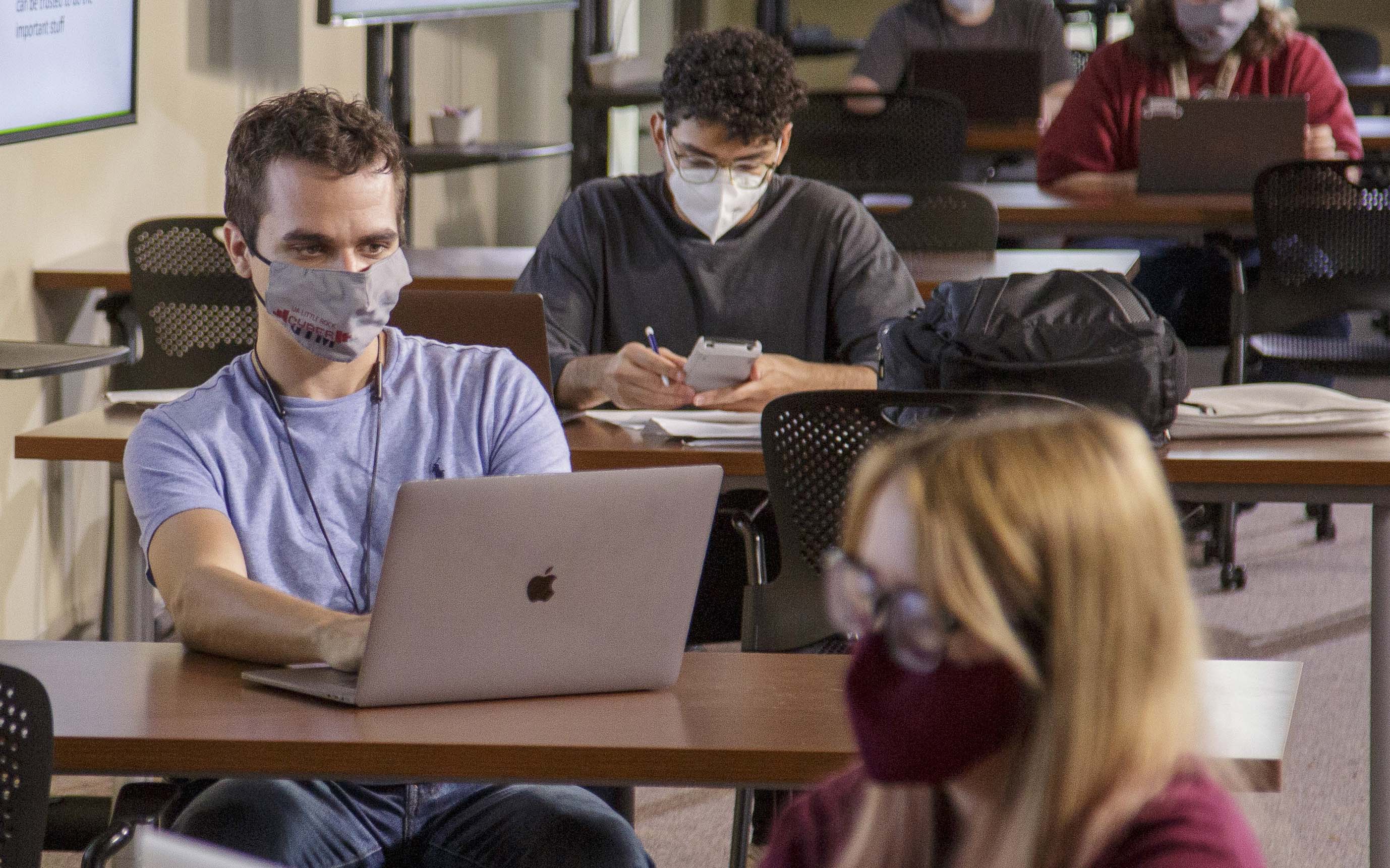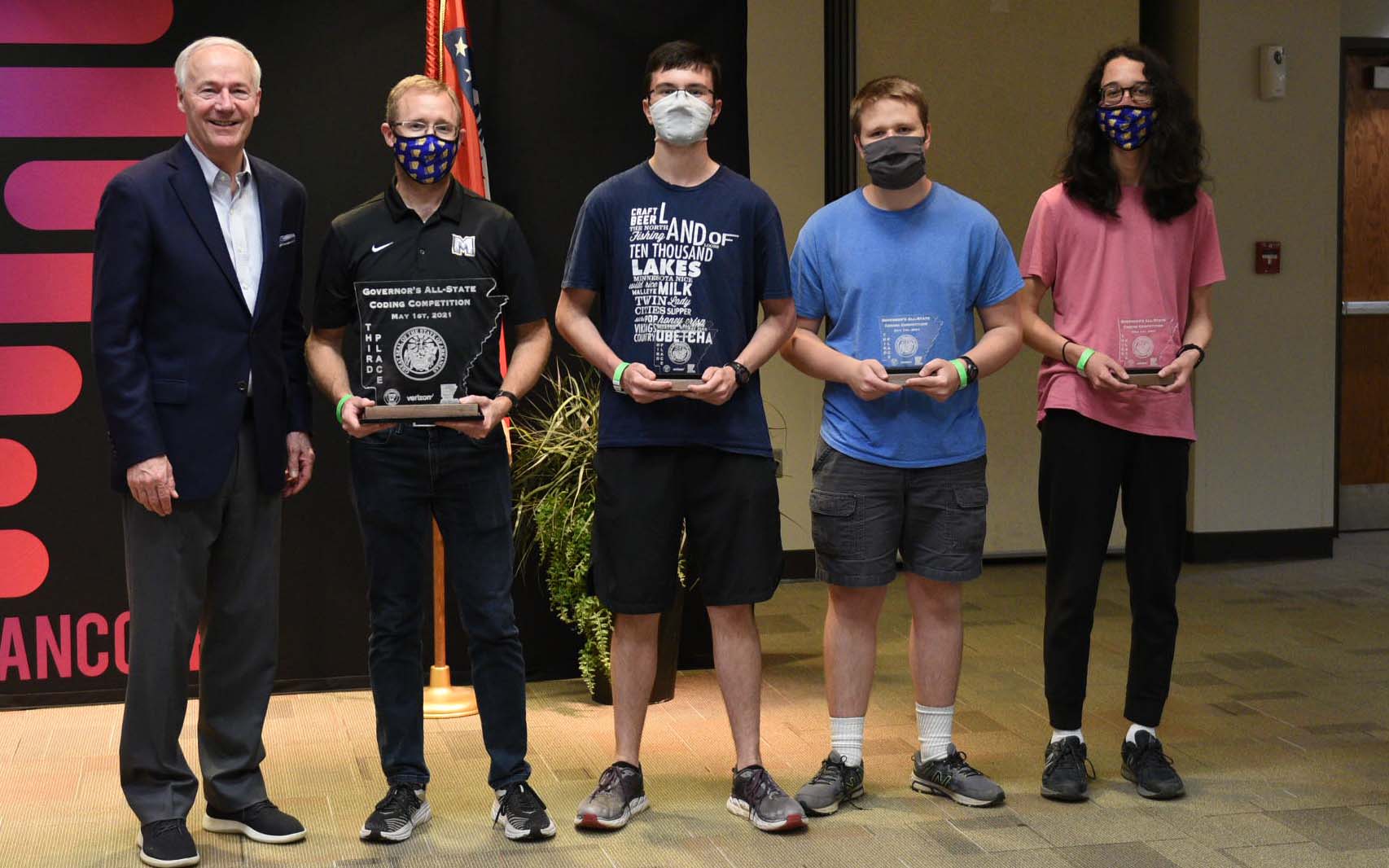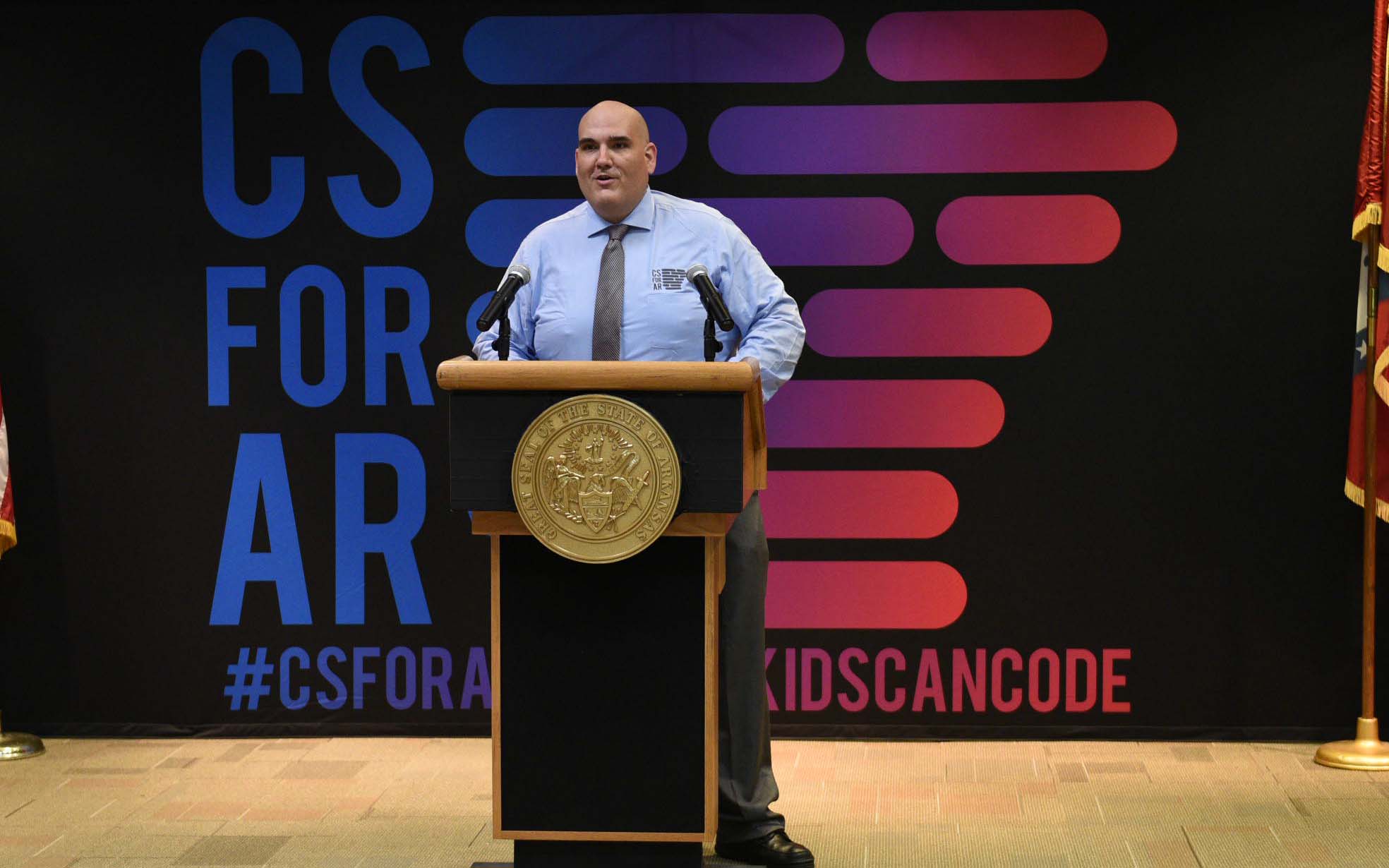UA Little Rock joins National Security Agency program to thwart new cybersecurity threats
October 18-24, 2021
By Chloe McGehee
The University of Arkansas at Little Rock recently received a $750,000 grant from the National Centers of Academic Excellence in Cybersecurity, making it one of the only universities in the country to offer a graduate certificate in cybersecurity education. This is a big step for the campus, but cybersecurity in Arkansas is growing at a fast rate in other ways, too.
For one, in 2015, Gov. Asa Hutchinson passed the Arkansas Computer Science Initiative, something he ran with in his campaign. When speaking on why he created this, Hutchinson said he saw educational, economic and security reasons for starting this program.
This initiative made computer science and cybersecurity education a priority within Arkansas, as well as encouraging cybersecurity education with colleges and universities to combat the workforce gap in cybersecurity. This was specifically targeted to K-12 levels of schooling to get kids interested in computer science as early as possible.
“At the K level, it’s more about getting kids to really understand what the technology that they’re using is, and how it works and how they can safely use it, especially at the lower grade levels,” said Anthony Owen, state director of computer science education at the Arkansas Department of Education. “Under our new legislation every student is going to have to have at least one credit in computer science in high school.”
After that legislation, most high school freshmen will take a basic computer science course, but Owen said that the goal was to get students to take a more in-depth, three-year course plan. They offer three paths for students to get computer science certifications and want to encourage students to study cybersecurity past that required first-year course.
“Those pathways have the same exact standards across the board and then they diverge greatly in year two and year three,” Owen said. “The first year, they’re going to come out with a good base level understanding of computer science. What we really tried to do with all of our pathways was we wanted to have the ability for students to get going at an entry level job directly from high school or be well suited to go into a major program at a university or college.”
“We wanted them to have prior knowledge that they could potentially offset some of their major hour requirements. So, we really wrote those high school courses to be a pathway, either directly into entry level jobs or our certification type programs, or a more traditional university pathway. One thing that we’re seeing is while we still are increasing our number of computer science majors around the state, we’re seeing more and more students exiting high school and going directly into the workforce with the skills that they’re receiving,” Owen continued.
Cybersecurity is one of the most in-demand jobs in the country. Not only does this need exist in Arkansas, but there also needs to be teachers for this, which is where the UA Little Rock Program comes in. Owen said they went from 22 teachers who could teach Computer Science to over 600 since 2016. UA Little Rock will help to create more and keep them up to date.
Cybersecurity goes to college
As cybersecurity is an ever-changing field, this can complicate the education process, which is why Owen fought to remake the K-12 curriculum on a four-year cycle, as well as having two-year check-ins.
“We were on a seven-year revision cycle whenever I started. I said there is no way we can do a seven-year revision cycle and expect to remain relevant,” said Owen. “So, what we actually have is a four year full revision cycle with a micro revision in the interim. We’ll look at our standards, especially the ones in ever changing fields like cyber security, machine learning and artificial intelligence. We’ll say ‘OK’ are there changes that we need to put in place for this micro revision or can it wait till the large revision? Things like our programming standards are not language specific, so they’re not written in Python or Java now. Schools can use either one, so there might be changes in the paradigms or the syntax within those languages, but our standards don’t have to be updated for that.
“Then in four years, we basically take all of our standards, K-12 and we say we need to evaluate all of them. Some of them will stay the same. Some will change and then we’ll say, has this system worked well for the past four years, or do we need to expand? Do we need to add a new course? We re-evaluate every single thing,” Owen explained.
The NSA’s National Cybersecurity Teaching Academy is a collaborative of 10 institutions in nine states that will offer the first credentialing program for high school cybersecurity education in the country. The inaugural program will prepare 90 high school teachers to teach an advanced cybersecurity course.
Teachers accepted into the National Cybersecurity Teaching Academy will receive funding covering tuition for the 12-credit hour virtual graduate certificate. Teachers who complete the academy will also have the option to complete six additional credit hours that will certify them to teach dual/concurrent enrollment cybersecurity courses.
According to UA Little Rock officials, the academy is an excellent fit with Gov. Asa Hutchinson’s and the Arkansas Department of Education’s efforts to make K-12 computer science education a priority. Under Hutchinson’s education agenda, one of the main reasons he made cybersecurity a priority in Arkansas was because he saw great economic opportunity within the field. This is seen in multiple facets of the program.
“[Hutchinson] knew the needs of the state as far as getting high quality, trained people into startups. At that point, we had 3000 jobs in computer science and computing that we were not filling as a state and so he saw it as an economic opportunity for our state, but also just something to keep our students relevant,” Owen said. “We were already at the beginning cusp of the fourth technological revolution, and you know, we’re already facing the 5th coming up soon, so you know he saw that as the students that are graduating without these skills are going to be the students who don’t have the knowledge to fulfill the jobs of tomorrow, you know by the time they graduate, especially the high paying jobs.”
Furthermore, Hutchinson saw cybersecurity as a “great equalizer,” where students from Little Rock and Mena or McGehee could have the same opportunities to learn a skill that would definitely earn them a job outside of high school.
“He saw it as an opportunity for schools and for our state economically, but also he recognized and talked about from day one that it was a great equalizer,” Owen said. “That you know a student in Dumas and Star City, if they just have an Internet connection, [they can do it]. Even back then he was talking about the ability for them to run the world from their front porch.”
Arkansas is facing a trial of keeping small, rural communities populated. While some may worry teaching their children these skills will encourage them to leave, Owen believes since computer science can be done from anywhere, it actually encourages people to stay in their hometowns. The COVID-19 pandemic has also shown us the benefits of working from home, some of which translate into a post-pandemic world.
“You might be able to stay in your hometown and continue providing economic advancements or economic benefits to those smaller communities, which is really so needed. In the past 18 months, the mindset of a lot of these companies [has changed],” said Owen. “They want their employees happy, and I think that’s one thing that the pandemic is going to bring more to the forefront. More companies understand there are people that want to work at home. Computer science is one of those fields that allows people to do that.”
There were difficulties spreading this computer science curriculum, though. Owen and his team at the Department of education had to find ways to change the way things were typically done. Normally, the ADHE distributed curriculum to school officials for them to give to the students, but with computer science, some officials were not on board with the new teachings, and were hesitant to distribute the learning materials.
“We do a lot of things with outreach to communities, but we are trying to go directly to communities from the Department of Education, which is different than how the Department had worked prior to this initiative,” Owen said. “We were one of the first entities in the Department of Education that was buying theater advertisements and social media. We were taking that message of these opportunities for students and communities directly to those parents, to those students and to those communities.”
Along with those pushes, Gov. Hutchinson was also quick to call school systems that were not disseminating the computer science curriculum and speak with them as to why Arkansas needed to make this a priority.
Hutchinson and Owen both hope that the program they have created since 2015 will be strong enough to stay around even after they both no longer hold their positions. With the upcoming administration change, Owen hopes cybersecurity will stay a priority in Arkansas.
“I’ve made this program with Gov. Hutchinson from its inception. Through the governor’s office, through legislature, through the work of our office, the leadership that we had built this program into something that’s beyond just a governor’s focus and I expect that it will have long standing and sustaining power,” said Owen. “I’m very proud of the work my team and I have done and the state has done in this and think that it will have a long lasting impact on the education and the economy of Arkansas. I want to see it continue even after Governor Hutchinson leaves office. I know that at some point my tenure here will end; my hope is that we built enough strength in this program and we’ve built enough desire across Arkansas in the teachers, students, communities, parents and educational leaders to understand why this is important.”
This hope goes past even just keeping school programs going, but into making Arkansas a technological hub in the future. That is shared by other Arkansas entities such as the Little Rock Technology Park, the University of Arkansas System and the Little Rock Chamber of Commerce among many others.
“It is what’s important for the state, it is important for our economic viability as we enter this 4th revolution, it’s crucial to us having students that are ready to take jobs and fulfill job needs that are critical to our nation and cybersecurity,” Owen said. “Because of what we’ve put in place for the past seven years, in 20 years, people will look at Arkansas as being the Silicon Valley of the middle US.”
Benefits of cybersecurity outweigh job growth, though. Cyber-attacks have been faced by the Arkansas government, universities and hospitals, something that is reflected in the rest of the country as well. The role of cybersecurity in today’s workplace and government cannot be understated. Owen explained that the US outsources work on cyber systems at an alarming rate.
“We do not have the workforce here in the United States to fulfill the needs of the US military or all of its contractors so we’re outsourcing a large portion of our critical infrastructure securing our electrical grids, securing our banks to overseas entities who may not have the best interest of our nation at heart. We have to build that talent pool here and we have to have a sufficient talent pool,” continued Owen.
This program does seem to be working, as Owen said Arkansas is the leader in computer science education in the country, and data shows that Fayetteville and Little Rock were two of the top three markets in the monthly increase in tech jobs postings.
Computer science is driving job growth and innovation throughout our economy and society. Computing occupations are the number one source of all new wages in the US and are projected to stay that way. In 2020, Arkansas had 2,362 open computing jobs with an average salary of $72,662, and these numbers continue to grow in 2021. Things could still be better, though. There is a gap between female and minority students taking the offered computer science courses, and teacher preparation programs in Arkansas only graduated 5 new teachers prepared to teach computer science in 2018. This is something Owen commends higher education institutions on, as those numbers have grown incredibly in three short years.
As Gov. Hutchinson said at his National Governors Association Chairman’s Initiative Launch, as technology changes and increases, so should our education.
“We’re doing more than imaginable after a pandemic,” Hutchinson said. “It is urgent and very necessary. We need to meet the young people’s thirst for learning and the demand of industry. It is also a national security goal we have to meet and it’s not partisan; it’s important to meet this goal across the board and the nation. Coming out of the pandemic, with telemedicine, online meetings, the need has never been greater.”
PHOTO CAPTION:
1. Cybersecurity goes to college - UA Little Rock has received a $750,000 grant from the National Security Agency’s National Center of Academic Excellence in Cybersecurity to build on Gov. Asa Hutchinson’s computer science and technology vision. (Photo By Ben Crain)
2. Gov. Asa Hutchinson speaks to participants at the Fifth Annual Governor’s All-State Coding. Competition was held on May 1, 2021, at the University of Arkansas in Little Rock’s Donaghey Student Center.
3. Anthony Owen, state director of computer science education at the Arkansas Department of Education.
4. Gov. Asa Hutchinson with the winners of the Fifth Annual Governor’s All-State Coding competition.






